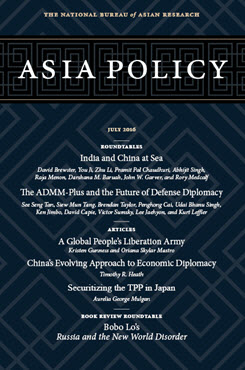Securitizing the TPP in Japan
Policymaking Structure and Discourse
This article attempts to measure and define the level of “securitization” of the Trans-Pacific Partnership (TPP) in Japanese national politics by analyzing both the structure of policymaking and the policy discourse on the TPP under the Abe administration until the October 2015 agreement reached in Atlanta.
EXECUTIVE SUMMARY
MAIN ARGUMENT
The TPP has been managed within the Japanese policymaking infrastructure largely as a trade policy issue, and references to its geopolitical and security aspects have been a relatively minor element of policy discourse. However, the content of public policy rhetoric on the TPP in arenas such as the Diet and its committees reveals widespread recognition of the geopolitical and security consequences of Japan joining the TPP. In this respect, as gauged from official rhetoric, Japan’s TPP policy exhibits some degree of securitization. Public comments suggest that Japanese political elites perceive the positive security externalities of the TPP as elements of multiple and mutually complementary balancing strategies against China.
POLICY IMPLICATIONS
- The Abe government appears to recognize the TPP as an important agreement that supports not only Japan’s economic and trade interests but also its security and geopolitical interests in regional stability and order.
- Public political discourse on the TPP suggests that the Abe government also views the TPP as an opportunity to help shape the rules of the emerging Asia-Pacific order in partnership with like-minded countries. Japan would prefer a rules-based order to a power-based one, which would favor China.
- If China remains outside the TPP, Japan can leverage the agreement’s size and scope to limit or condition China’s trade influence in East Asia. Should China join the TPP, it will need to operate within a framework of rules that Japan helped create.
- Japan’s TPP posture complements U.S. policy on the TPP as a trade framework that supports the strategic rebalance to the Asia-Pacific and U.S. trade leadership in the region.
About Asia Policy
Asia Policy is a peer-reviewed scholarly journal presenting policy-relevant academic research on the Asia-Pacific that draws clear and concise conclusions useful to today’s policymakers. Asia Policy is published quarterly in January, April, July, and October and accepts submissions on a rolling basis. Learn more


